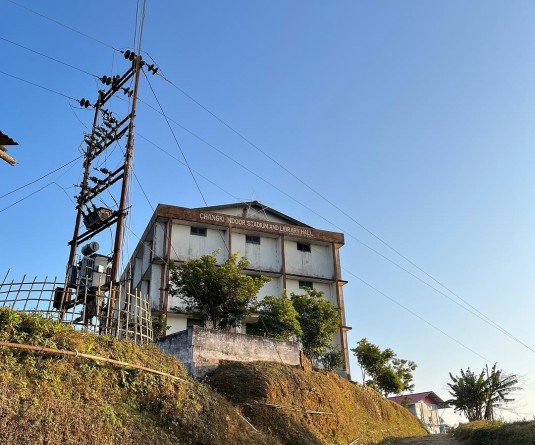
In conversation with Neichüte Doulo
Vibi Yhokha
Kohima | April 17
“In the next twenty years, we will be de-populated. It’s very simple! That’s how economic imbalance takes place if we are not careful,” says Neichüte Doulo, Naga economist and president of Nagaland Entrepreneurs Associates who feels that out of the 50,000 jobs generated 48,000 will be from Bangladesh and Assam. Doulo asserts, the Nagaland Special Development Zone (NSDZ) is a good idea but not the best model of development for Nagaland because industries and factories go against the Naga mental life and will only bring in more workers from outside.
“Nagas as a community are not mentally prepared for factory working culture. It needs ecosystem. You need a population that is ready to serve in the factories. I don’t believe that Nagas are ready to work 12 hours a day,” says Doulo, further asserting that young people cannot be pushed to work in factories when Nagas have lands, strong social security and backdoor appointments. “The idea of attracting outside investment is good but it will come if we have the basic infrastructure, it won’t just happen because of the availability of land. We need power, rail and road. This can improve drastically overnight if there is political will,” adds Doulo. He opines that the volatile geopolitics in Nagaland will not attract companies to invest because neighbors will continue bandhs, blockades and that Nagaland will continue to have law and order problems. The government needs to debate, analyze and agree, in principle, what will be the most suitable economic model for the Nagas.
Two Models of Economic Development
Doulo cites two models of economic development namely Industrialization based on manufacturing, and Human Development Capital. Doulo feels that it is a wrong notion that economic growth can be propelled by manufacturing industries. After sixty years, this model has not proved to be the best model. However countries like Singapore and South Korea, which adopted the human development models of tourism, education, banking, health, trading, have 40 times more per capita income than India. And these are countries that underwent the same condition as India 60 years ago.
Looking at our immediate neighbors, Doulo points out that Meghalaya’s vibrant Education Industry attracts one lakh tourists from Nagaland every year. Sikkim’s Eco Tourism receives more tourist population than their own population. Imphal’s Health Industry has attracted Burmese who come to Imphal for health treatment and this happens despite bandhs and bombs. One does not have to lease out land for a healthy industry like Sikkim’s eco-tourism model which do not have to sell lands nor does it attract social evils like prostitution. “We have not studied our MAs and BAs to become labourers. We need to find ways and means to make use of our potentials and skills,” adds Doulo.
How do we re-construct ourselves again? The way to economic development and generating employment
• Unlearning: “Study hard, get a government job, and then you will live happily ever after and not studying hard will end you up looking after the cows and cattle. This type of mental programming seriously needs to change,” says Doulo, who feels that Nagas need to unlearn what we have learned and to learn what we do not know.
• Need for economic advisors and careful economic planning: Doulo is of the view that the government needs economic advisors, people who know economics and who have entrepreneurial experiences. Assam has an economic advisor to the Chief Minister but Nagaland has none. “We need to consult business people, industrialists and not Hohos and bureaucrats. They have no idea about economic development. There is a beginning made when you admit that you don’t know,” says Doulo while adding that Nagaland has the best track record of not valuing its entrepreneurs.
• Education, Music and English as an industry: “China needs 3 million English teachers and that is more than the Naga population. The South East Asian nations are starving for English. Today English is our asset, our comparative advantage,” says Doulo. If Nagaland can train 10,000 English teachers with international standards, who can pass the TOEFL and spread through South East Asia, Doulo feels that it will be much better than sending our kids to work as maids and labourers in Korea. Starting 100 English tutoring institutes that give two month crash course will give employment to thousands, profitable for hotels and further improve air traffic. Apart from that education and music can be good industries for the Nagas.
• A land-linked state: Economic development is interdependent; we need to learn how to grow together. Economic blockades, harassing Manipur trucks passing through Dimapur to Kohima will not improve economic development.
• Setting the right priorities: Doulo is of the view that Nagaland has lot of mismatch in its priorities. “We are only trying to replicate what others are doing. We have only been using the top-bottom approach.” Citing the example of tourism based on festivals, Doulo asserts people will not come and do business in a land of festivals because the very idea of festival means enjoyment and not opportunity; what investors only look forward to is a land of opportunities.
• Going against the status quo: Statehood was thrust down upon the Nagas when they were not ready. With no idea of modern governance, a state with a majority population of farmers was created, which only meant getting money from Delhi. And even after 50 years Nagas are still intoxicated. “With due respect to parents, I wish all young people revolt. Revolt against the status quo, the culture we believe in- the false belief that the government is the only provider. We still think that the government will give us job and security. This is the legacy our parents have passed on to us which needs to be challenged,” concludes Doulo.





